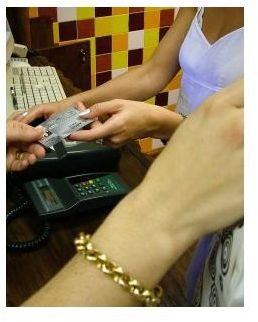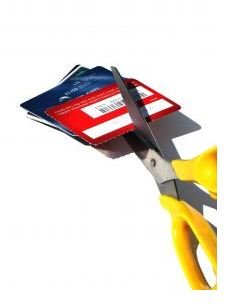Are You Mortgaging Your Future to Pay for Your Past and Present Pleasures?
Consumer spending and saving patterns have changed drastically over the last hundred or so years.
We have evolved from a frugal, “if you can’t pay cash for it, you can’t afford it” generation to a consumption addicted generation drunk on the intoxication of a never-ending supply of credit.
Shifting funds and accounting manipulations do not work for the federal government and they will not work for the average individual either. Eventually, the debt has to be paid or you will be broke.
How Our Parents Handled Finances

During my parents’ life of growing up shortly after the Great Depression (the 30s), and entering the workforce (the 50s), they developed frugal habits to budget their funds and pay their bills. A popular budgeting method used during those hard economic times was the envelope system.
My dad would bring his pay home (in cash), and they would divvy it up into the appropriate envelopes: house payment, groceries, gas and so forth. My dad would be quick to tell you that there was certainly no envelope marked “eating out” or “entertainment.”
“If there was any money left over after we paid all our bills,” he would pontificate, “we might go to the movies or get an ice cream cone at the soda shop. If there wasn’t any money left over, we would go to the park and have a picnic. That was our entertainment!”
It was simple system, but it certainly worked. They paid for everything in cash, spent less than they earned, and made short-term sacrifices for long-term gains. Today, they are retired, own their own home and vehicles, and live comfortably on their retirement savings.
While they no longer dole their money out into envelopes every week, those ingrained frugal habits sustained them through the ups and downs of my father’s career as a self-employed real estate broker. This generation understood that if you spend more than you make, eventually you will run out of money and be broke or bankrupt: they had seen it happen with their own eyes. Buying on credit was almost unheard of and might be considered shameful or scandalous. They respect the value of a dollar and its purchasing power.
How My Generation Handled Finances

As America came out of the depression and became more prosperous, a generation was spawned that cut their teeth on plastic and cautiously tested the waters of gratifying their consumption desires with an ever-increasing credit line. The first credit cards—American Express and Diners Club—debuted in 1950.
This generation was introduced to the concept of making monthly payments and spending more than we made because we assumed we would just make more tomorrow. We scoffed at our parents’ frugality and used our credit cards or credit lines to buy new cars, new homes, and new lifestyles. We traded our yellow stamps or green stamp books, coupons, and premiums tucked into laundry detergent and cereal boxes for more and more shiny, plastic status cards.
We were bombarded by subliminal and not-so-subtle advertisements for the latest and greatest credit card or store charge account and we ate them up. Instead of teaching our children to delay gratification and save up for purchases, we over-indulged them and tried to give them every material possession that we felt we had been denied. Many of us even sent our children off to college with a shiny, plastic token of credit clutched in their greedy little hands.
How Our Current Generation Views Finances

If one credit card or credit limit is maxed out—no problem—just apply for and receive a brand spanking new one with an even higher credit limit. If you can’t afford to purchase that new car on a traditional three-year installment payment plan, you just opt for the 60 or 72-month option. By the way, if you think a 72-month car payment doesn’t sound that bad, you are right. It does not sound as a bad as a six-year car loan, which is why it is marketed as a monthly payment to soften the sticker shock for consumers.
If you want to know how our current generation feels about saving money and delaying gratification, just flip on the television set or radio and follow the news reports about the Occupy Wall Street protestors. This generation feels entitled to a government handout and bailout. They have no interest in working a semester to earn their tuition money and then attending college for a semester because that would take too long. No, they want that degree—they are entitled to it—and they want it now.

Rather than accepting the responsibility for incurring more debt than they could ever pay off, they want their rich Uncle Sam to take care of them and pay off their student loans. However, what’s the cost to the American taxpayer? Want to know a mind-numbing statistic?
Student loan debt owed to the federal government totals one hundred billion dollars in 2011, according to Fox Business writer Gerri Willis. Not surprisingly, given their abysmal track record to date, the White House administration’s answer to this and other financial problems is to tax more, to spend more, and to kick the can down the road to our future generations.
If you think it begins and ends with individuals who spent more than they made and now refuse to accept the responsibility for their poor choices, look at our federal government. Who can even imagine what trillions of dollars of debt really looks like in cold hard cash? (Keep in mind where good ol’ Uncle Sam gets his money, and you’ll understand why your own finances are feeling the pinch.)
Is It Really a Debt Versus Income Issue?

Fast forward to 2011, where we are reaping the fruits of unrestrained consumption with no thought of where the money to pay the bills would come from. Our government is going broke at an alarming rate, and so are an alarming number of Americans. Home foreclosures are at record highs, student loan defaults are sky rocketing, and unemployment is at the highest level it has ever been.
While many people still labor under the delusion or believe the media hype that individuals or the government have a debt problem, there are others who have finally come out of their denial to face the facts: Americans and America have a spending addiction.
The problem is not a lack of jobs, an inadequate income, insufficient savings or retirement income, higher costs of living, or even taxes. The root cause, whether you are discussing the government’s budgetary woes or an individual’s financial problems, is out-of-control spending.
You don’t have to be an economist or have a college degree to understand that if you continually spend more than you make, at some point in time, the balance scale will tip against you, and you will be unable to pay your bills or sustain the lifestyle you want to maintain.
Solve the Problem

Like most problems, the solution is simple but painful because it calls for a change in behavior. Humans by nature resist change and pain. However, just as plastic surgery can give you a new nose, a new face, or a new figure, a “creditectomy” gives you a new life and freedom.
There are many great services and organizations available to help you get your debt under control when you are willing to take that step. In the meantime, here are some short-term steps to stop the bleeding and get your finances back in shape:
- Set aside money for emergencies. This way you are not tempted to put an unforeseen expense on a credit card or installment payment plan.
- Cut your credit cards up and close your credit accounts.
- Prioritize your debt and pay off the smallest bill first. When that one is paid off, don’t have a party and celebrate with the extra money. Start paying off the next smallest debt immediately.
- Keep adding to your emergency fund to build up a three to six month reserve.
- Sell the extra vehicles, toys and gadgets that you really didn’t need in the first place. Use the money to pay down debt.
- Stop spending money you do not have. Just stop the insanity.
- If you can’t pay for it with cash, don’t buy it. If you don’t need it, don’t buy it. If you are not sure, refer back to number 4.
Keep in mind that these are emergency measures to stop the outflow of cash. Just like a bandage only stops the bleeding but doesn’t heal the wound, you will need to make a budget and stick to it to get your financial house back in order. Money does not buy happiness but it does leverage your options and buys your freedom, which is priceless.
References
- Image: http://www.sxc.hu/photo/1323680
- Image: http://www.sxc.hu/photo/1029825 by hisks under royalty free license
- Undisclosed author, “The History of Credit Cards,” http://didyouknow.org/creditcards/
- Image: http://www.sxc.hu/photo/1176251
- Image: Uncle Sam pointing finger by James Montgomery Flagg (1916-1917) under public domain
- Image: http://www.sxc.hu/photo/1222661 by iamwahid under royalty free license
- Undisclosed author, “How to avoid drowning in car debt,” http://www.lendingtree.com/auto-loans/advice/auto-loan-basics/avoid-drowning-in-car-debt/
- Image: http://www.sxc.hu/photo/1029825
- Willis, Gerri, “Surprising Stats on Student Debt,” http://www.foxbusiness.com/on-air/willis-report/blog/2011/10/25/surprising-stats-student-debt
- Image: http://www.sxc.hu/photo/213544
- Limbaugh, David, “You Can’t Wait? Neither Can We,” http://davidlimbaugh.com/index.html
